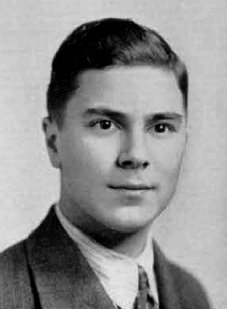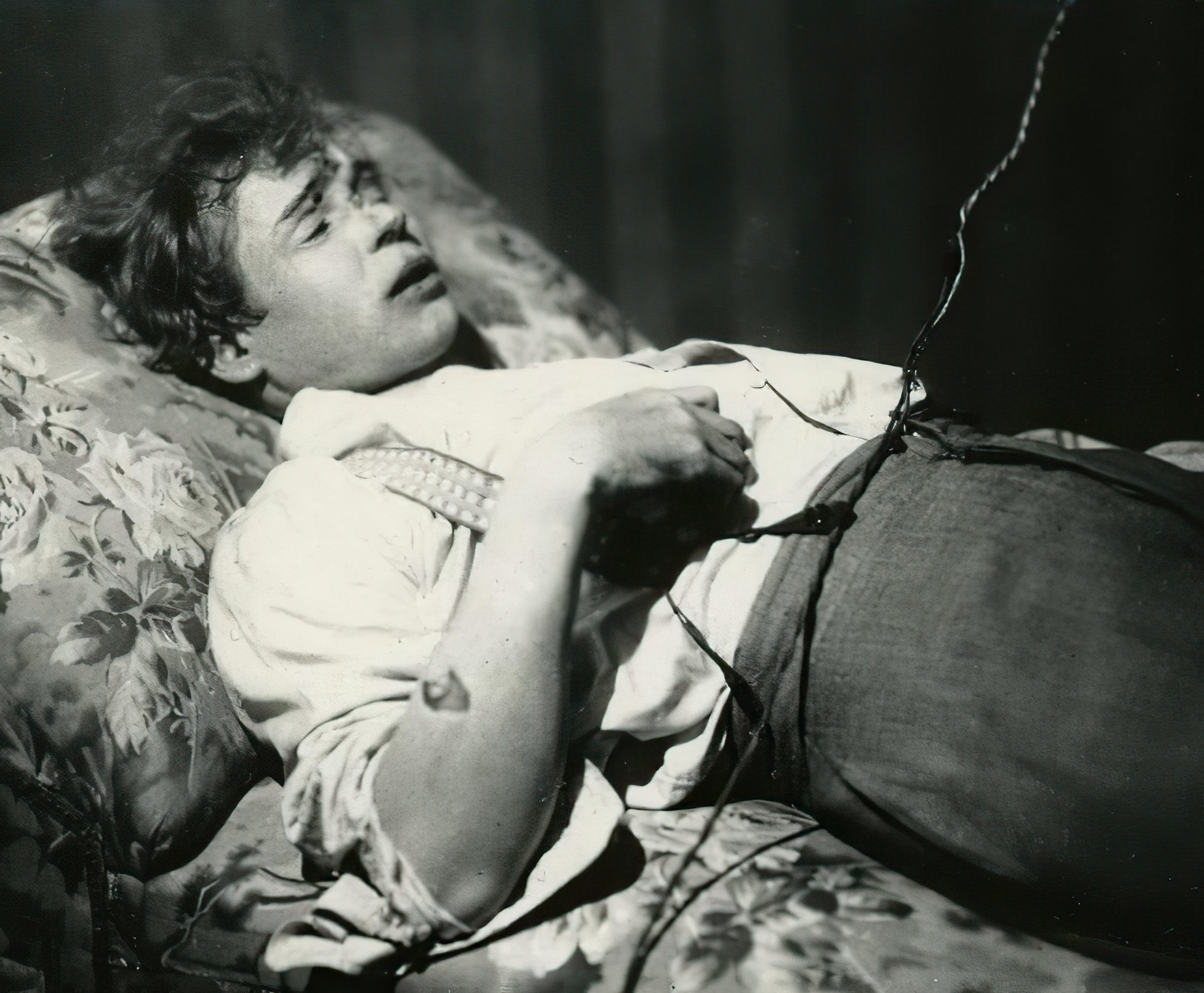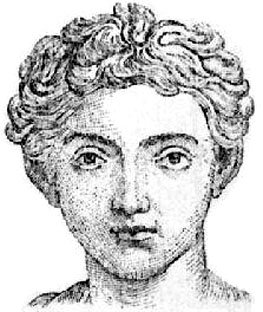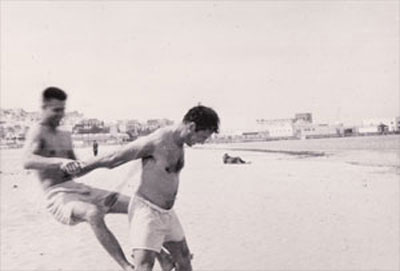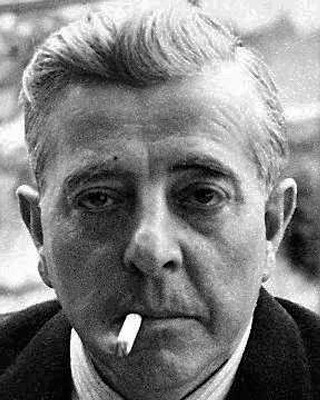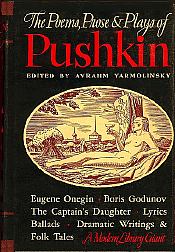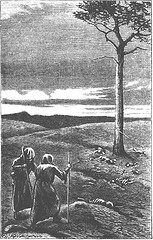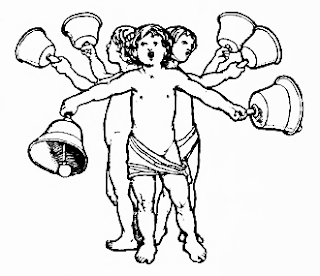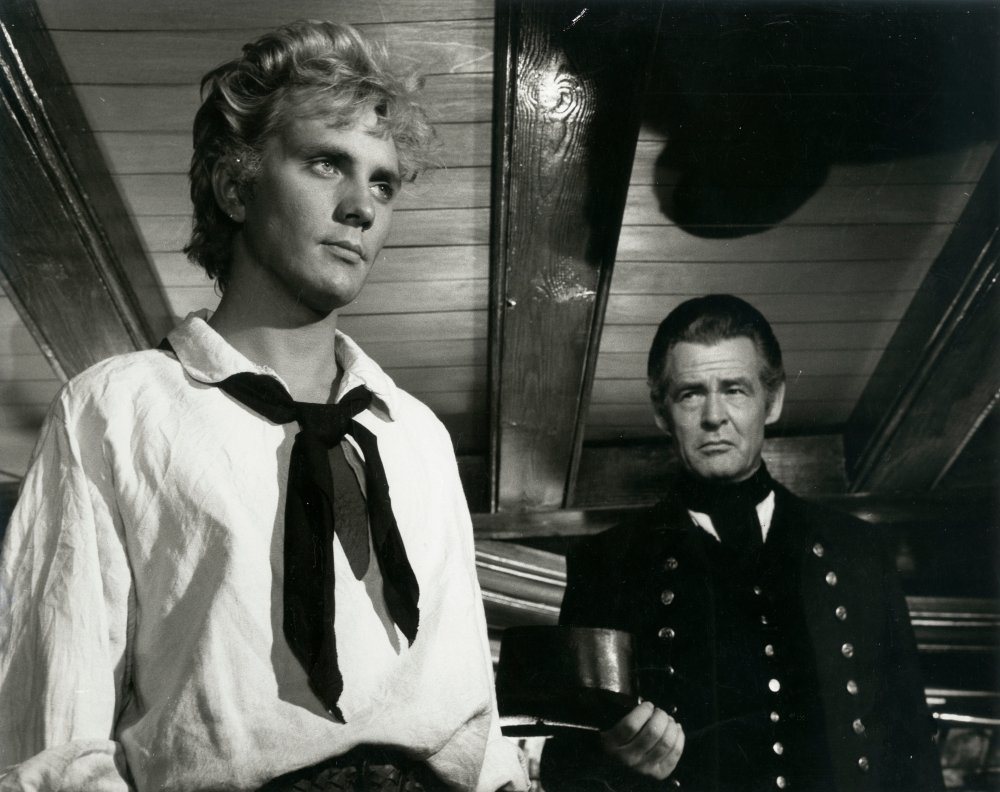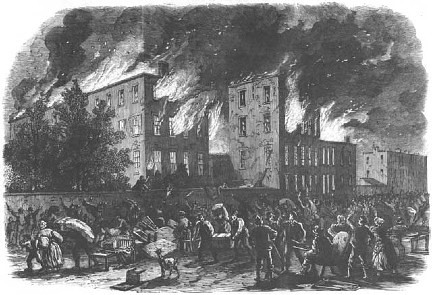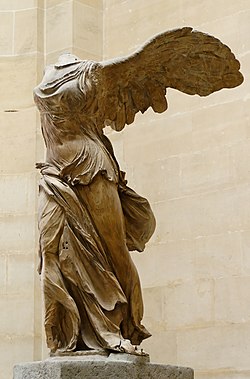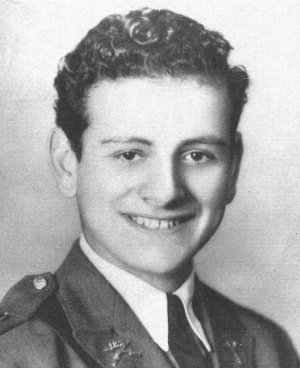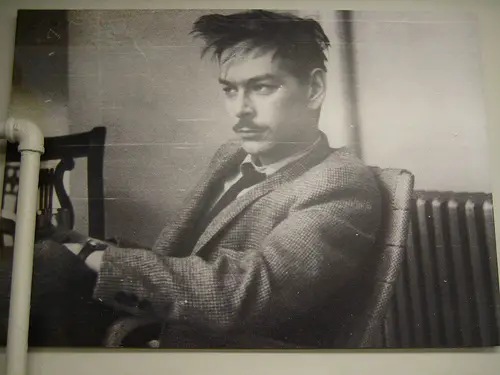![]() AG: Then, another heroic precursor, nineteenth-century, is Herman Melville, as a poet. How many here have run across Melville as a poet? Yeah. Has anybody here read Melville as a prose writer? - Moby Dick? That's much more common. And how many have seen his poetry again [show of hands] - Yeah - I think he's one of the four great poets of the nineteenth-century - (Emily) Dickinson, (Herman) Melville, (Edgar Allan) Poe (and) (Walt) Whitman. His work in poetry isn't as well known, but it's great. And he's got a big thick book. Robert Penn Warren did a selection of them back in 1967, and then a guy calledHoward P Vincentdid a Collected Melville - (a) thick volume, about eight-hundred pages (five-, six-, seven-hundred pages)). University of Nebraska, back in the (19)40's. His poetry is almost Shakesperean in some ways. Let's see what we've got here.
AG: Then, another heroic precursor, nineteenth-century, is Herman Melville, as a poet. How many here have run across Melville as a poet? Yeah. Has anybody here read Melville as a prose writer? - Moby Dick? That's much more common. And how many have seen his poetry again [show of hands] - Yeah - I think he's one of the four great poets of the nineteenth-century - (Emily) Dickinson, (Herman) Melville, (Edgar Allan) Poe (and) (Walt) Whitman. His work in poetry isn't as well known, but it's great. And he's got a big thick book. Robert Penn Warren did a selection of them back in 1967, and then a guy calledHoward P Vincentdid a Collected Melville - (a) thick volume, about eight-hundred pages (five-, six-, seven-hundred pages)). University of Nebraska, back in the (19)40's. His poetry is almost Shakesperean in some ways. Let's see what we've got here.
Peter Orlovsky: Did he read a lot of (William) Shakespeare?
AG; He read a lot of Shakespeare, yeah - Shakespeare and Sir Thomas Browne, and the great English prose writers![]() [Sir Thomas Browne 1605-1682]There are a few poems by Melville that I'll bring up. How many have read "Billy Budd" - the handsome sailor?. There's a poem at the end of "Billy Budd" that's very beautiful, that has a Shakespearean ending, actually. Billy is a handsome boy who is attacked by some evil, covetous, first-mate, who loves him in secret and so contends with him, and puts him up-tight, and lies about it, and says that Billy is trying to start a revolution, a mutiny - and Billy is so outraged by this when he finally hears about it, and confronts.. Innocent Billy is so outraged that he stammers, and suddenly strikes out, and with one blow kills Claggart, the evil guy. And then Captain Vere, who has to judge in this situation, says, "Well, you've got to die for it. You broke the law. You "fought the law and the law won" - So this is Billy's "I Fought The Law and The Law Won"- Billy is tied up [Allen begins reading Melville's poem - "Good of the chaplain to enter Lone Bay/And down on his narrowbones here and pray/ For the likes just o' me, Billy Budd..but look -/Through the port comes the moonshine astray".."..me they'll lash me in hammock, drop me deep/Fathoms down, fathoms down, how I'll dream fast asleep./I feel it stealing now, Sentry, are you there?/ Just ease this darbies at the wrist, and roll me over fair,/I am sleepy and the oozy weeds about me twist" - So the thing with him (as with Moby Dick) there's that vowelic melody - "I am sleepy and the oozy weeds about me twist" - Like the last line ending his great prose-poem,Pierre - "and her long hair fell over him and arbored him in ebon vines" -" And her long hair fell over him and arbored him in ebon vines" - that's the line of a novel, Pierre.
[Sir Thomas Browne 1605-1682]There are a few poems by Melville that I'll bring up. How many have read "Billy Budd" - the handsome sailor?. There's a poem at the end of "Billy Budd" that's very beautiful, that has a Shakespearean ending, actually. Billy is a handsome boy who is attacked by some evil, covetous, first-mate, who loves him in secret and so contends with him, and puts him up-tight, and lies about it, and says that Billy is trying to start a revolution, a mutiny - and Billy is so outraged by this when he finally hears about it, and confronts.. Innocent Billy is so outraged that he stammers, and suddenly strikes out, and with one blow kills Claggart, the evil guy. And then Captain Vere, who has to judge in this situation, says, "Well, you've got to die for it. You broke the law. You "fought the law and the law won" - So this is Billy's "I Fought The Law and The Law Won"- Billy is tied up [Allen begins reading Melville's poem - "Good of the chaplain to enter Lone Bay/And down on his narrowbones here and pray/ For the likes just o' me, Billy Budd..but look -/Through the port comes the moonshine astray".."..me they'll lash me in hammock, drop me deep/Fathoms down, fathoms down, how I'll dream fast asleep./I feel it stealing now, Sentry, are you there?/ Just ease this darbies at the wrist, and roll me over fair,/I am sleepy and the oozy weeds about me twist" - So the thing with him (as with Moby Dick) there's that vowelic melody - "I am sleepy and the oozy weeds about me twist" - Like the last line ending his great prose-poem,Pierre - "and her long hair fell over him and arbored him in ebon vines" -" And her long hair fell over him and arbored him in ebon vines" - that's the line of a novel, Pierre.![Billy Budd (1962)]() [Terence Stamp (Billy) and Robert Ryan (Claggart) in the 1962 screen adaptation of Billy Budd]
[Terence Stamp (Billy) and Robert Ryan (Claggart) in the 1962 screen adaptation of Billy Budd]
And so there's a kind of power-sound he gets - There's a famous poem called"The House-top", from New York, July 1863, when there were Draft Riots. He went upon the roof of his house on Twenty-third Street and heard the noise of people screaming, and shots. This is when (President Abraham) Lincoln, I think, ordered troops to fire on the draft rioters. So, it's called "The House-top - A Night Piece" - Now, "Draco" - who knows? - Draco? - you know the term "Draconian laws"? ![]() [NewYork City Draft Riots 1863 - contemporaneous image from The Illustrated London News]Student: Sure
[NewYork City Draft Riots 1863 - contemporaneous image from The Illustrated London News]Student: Sure
AG: Draco was an Emperor, a Roman Emperor, who came and gave... Roman? What?
Student: It's Greek.
AG: Greek?
Student: Spartan
AG: Spartan, yeah - What's the story of Draco and his harsh laws?
Studen: I think he was an Archon, who, during a time of trouble, set up some laws to stabilize the state
AG: Yeah, and the phrase (adjective) "Draconian laws" means really tough, tough laws - chop your hands off for stealing a pea!
And "Calvin's creed measured" here is the creed that, if you are prosperous, you'll be prosperous. And if you're pre-destined to be damned, you can see it by the weak look on your face, and the fact that you ain't got no money in your pocket, and you're going around asking for spare change" - [Allen then begins reading "The House-top - A Night Piece"] - "No sleep, the sultriness pervades the air/And binds the brain - a dense oppression such/As tawny tigers feel in matted shades/ Vexing their blood and making apt for ravage" - that's very Shakespearean - "Vexing their blood and making apt for ravage./ Beneath the stars the roofy desert spreads/Vacant as Libya.." - That's a real Kerouac-ian line - and Shakespearean - "Beneath the stars" - This is New York City, Manhattan - Beneath the stars the roofy desert spreads/Vacant as Libya. All is hushed near by./Yet fitfully from far breaks a mixed surf/Of muffled sound, the Atheist roar of riot/ Yonder, where parching Sirious.." - the star - [Allen continues, reading the poem] - "..set in drought,/Balefully glares red arson.."... "The grimy slur on the Republic's faith implied/Which holds that Man is naturally good,/ And - more - is Nature's Roman, never to be scourged"..] - Are you (were you) able to follow? - Well, (so), he's up on the roof. There's a vast solitude of roofy desert, "vacant as Libya", everything is hushed, but from down on around Wall Street, Twenty-third (Street) to Wall Street, he hears a rioting, the roar of the draft riot....[Allen continues] - "Yonder where the dog star Sirius, is setting.." - Downtown, I guess. In the south, that would be - Where does Sirius set in the sky?
![]() Student: In the north?
Student: In the north?
Student: Isn't there some relationship to the Big Dipper?
AG: Does anybody know?
Student: It's part of Canis Major
AG: So if you were in Manhattan, looking at Sirius, what direction would that be? Uptown? Downtown?
Student: (Well, it would depend what time of the year it was)
AG: Well this is July. Anybody know astronomy..?
Student: Nobody can see the stars in Manhattan anyway!
AG: Anyway, whatever direction Sirius is, there are burning buildings..."Balefully glares red arson" - Arson is the burning up of buildings. All the hippies, and draft-rioters, and Yippies, and Dippies, are out making riots - "The town is taken by its rats - ship-rats/ And rats of the wharves" - All the conventions, or "civil charms'' ("All civil charms/And priestly spells which late held hearts in awe.."), or agreements (social agreements) that kept order so nobody was sticking each other in the teeth....
Peter Orlovsky: This was the Civil War?![]() AG: Yeah. There were draft riots. People didn't want to be drafted to go down and fight. "All civil charms" which kept people in order are suddenly dissolved and it looks like everybody's turning into beasts, going back aeons in time. And then, all of a sudden, you hear the fire engines and the paddy wagons coming up - "Hail to the low dull rumble, dull and dead/And ponderous drag that jars the wall", as they bring up the cannon (and I guess with horses - I guess it was a horse-drawn cannon, and horse-drawn...)
AG: Yeah. There were draft riots. People didn't want to be drafted to go down and fight. "All civil charms" which kept people in order are suddenly dissolved and it looks like everybody's turning into beasts, going back aeons in time. And then, all of a sudden, you hear the fire engines and the paddy wagons coming up - "Hail to the low dull rumble, dull and dead/And ponderous drag that jars the wall", as they bring up the cannon (and I guess with horses - I guess it was a horse-drawn cannon, and horse-drawn...)
Peter Orlovsky: To shoot at the draft resisters?
AG: Yeah, to shoot at the rioters. I love that line - - "Hail to the low dull rumble, dull and dead/And ponderous drag that jars the wall" - "ponderous drag that jars the wall" - he has a fantastic ear. It's very distinct...
Student: Who is this?
AG: Herman Melville!. - the author of Moby Dick, writing poems...
Peter Orlovsky: But why "hail"? Is he.. he's..
AG: Well, I guess he's..
Peter Orlovsky: ..happy the riot's being stopped? - or..?
AG: Well, I think he was on the Northern side and he thought slavery was a bad thing. But, also, I don't think he was that much involved, in a sense of judging. It was just that it reminded him of an old Roman riot, the clang of a Roman scene..
Peter Orlovsky: You think..
AG: But he's got Rome mixed up with Greece. He's talking about Draco coming and then "nature"'s Roman ("aeons back in nature"). So he's got it mixed. That's why I got it mixed up.
Student: Do you think..do you think that the reference to ship's rats is indicative of the fact of, you know, that, in contemporary times, a riot was seen as being perpetrated by shady outcasts of society?
AG: Probably. Just like now. Because he's calling them "ship-rats" - "The atheist roar of riot" (is) interesting too - the atheistical subversives! - "godless Communists"!
![Selected Poems of Herman Melville: A Reader]() Peter Orlovsky: Wasn't Melville.. Wasn't Melville an atheist?
Peter Orlovsky: Wasn't Melville.. Wasn't Melville an atheist?
AG: Later, I think he got to be, yeah. But I don't know. Well, I don't know. He was fighting with it, sort of. Because the whole point of Melville ( is) he's got his hero chasing God, chasing the big white whale, or chasing the vast abstraction.
Peter Orlovsky: Where was Melville, when this was.. I mean..
AG: Out..
Peter Orlovsky: Whitman? (Walt) Whitman..?
AG: Whitman, I think, was in Washington, taking care of the wounded.
Student: The ship's rats there are probably immigrants...
AG: Maybe..But (so) you were mostly able to follow it? - It just went on to say, so the troops are coming to shoot at the rioters - "Wise Draco comes, deep in the midnight roll/ Of black artillery"- That's the line I like the best - "Wise Draco comes, deep in the midnight roll/ Of black artillery" - See, it's actually a round thing in your mouth when you pronounce it. It's like cocksucking or something! -"Wise Draco comes, deep in the midnight roll/Of black artillery"- You've got a thing in your mouth there when you're pronouncing it, an "air-cock" is what I'm saying, you've got an "air-erection" in your mouth!
No, but the physical mouthing of the language is what gives the power, I think - the realization of the hollow vowels, the hollow-ness of the vowels. It's like, in a state of inspiration the body becomes a column of air, actually. You've heard that description?.. like the empty body becomes a column of air. The body seems to be hollow and become a column of air, very light. And that's the actual physical sensation of a state of inspiration. Has anybody experienced that? You might get it, say, in a love situation, where you're talking, or perhaps in an anger situation - righteous wrath - duh-dah! - But when the speech is unobstructed and breath is unobstructed and it feels like a column of air or a hollow reed..
![]() So, he comes, Draco, the dictator comes, to restore law and order, the man on horseback, as we know him these days, "though late". I didn't understand the (next) line(s) - "In code corroborating Calvin's creed/And cynic tyrannies of honest kings" - "cynic tyrannies of honest kings"? - what is that? - (Henry) Kissinger? - "cynic tyrannies" - or is it just...
So, he comes, Draco, the dictator comes, to restore law and order, the man on horseback, as we know him these days, "though late". I didn't understand the (next) line(s) - "In code corroborating Calvin's creed/And cynic tyrannies of honest kings" - "cynic tyrannies of honest kings"? - what is that? - (Henry) Kissinger? - "cynic tyrannies" - or is it just...
Student: He seems ambivalent of himself or the situation.
AG: Pardon me?
Student: He seems ambivalent
AG: Oh, yes, he is. Oh, definitely, definitely. And actually what he says - "and the Town redeemed/Give thanks devout' - the dumb fucks are glad to be rescued from themselves!
Student: Yeah.
AG: "(N)or, being thankful" - The crowd, the town, doesn't heed that it's a big insult to the original conception of the Republic - the original conception, the faith, of the Republic, which was that that Man is naturally good, and is not going to be punished. Like the Roman citizen - you don't get punished - you're a free man. You might punish the slaves, but not the citizens. But here he's saying that they're asking for it, they're asking for it from above.
I'm interested in his rhythm and his sound. Here's an interesting piece of (short quatrain) rhetoric - "Implacable I, the old implacable Sea;/ Implacable most when most I smile serene --/ Pleased, not appeased, by myriad wrecks in me" [section V of his poem "Pebbles"] - talking about the ocean - "Pleased, not appeased, by myriad wrecks in me" - or his person - "Pleased, not appeased, by myriad" failures of his life. Then next ["Healed of my Hurt"] -"Healed of my hurt, I laud the inhuman Sea -/ Yes, bless the Angels Four that here convene/ For healed I am even by their pitiless breath/Distilled in wholesome dew named rosmarine " - Just so pretty! - but also powerful - "Healed of my hurt, I laud the inhuman Sea.." - it's old-fashioned rhetoric - Yes, bless the Angels Four that here convene " - "Healed of my hurt, I laud the inhuman Sea" - try that on - try "laud(ing) the inhuman Sea".![Stock Photo Smoke from a Black Woman's Lips]()
Then he has a really interesting poem during the Civil War (or a few interesting lines in it (that) I like). (It's called)"The Swamp Angel. I've mentioned it before a few times. This particular poem had quite an effect on (Jack) Kerouac's adjective and rhetoric - "There is a coal-black Angel/ with a thick Afric lip.." You know that? Did I bring that up before (I think I mentioned it before) - "The Swamp Angel" - [Allen reads Melvlle's "The Swamp Angel" - "There is a coal-black Angel/ with a thick Afric lip/And he dwells (like the hunted and harried)/In a swamp where the green frogs dip"..."Who weeps for the woeful City,/Let him weep for our guilty kind -/Who joys at her wild despairing -/Christ, the Forgiver, convert his mind." - So the "Swamp Angel" is a cannon. You all got that? Anybody pick that up? - "There is a coal-black Angel/ with a thick Afric lip.." - There's also a parable of the guilt over slavery, I imagine. Interesting. "Vainly she calls upon Michael/(The white man's seraph was he)" - I never thought of that. But I liked the way he said “Afric” (he cut the adjective, instead of “African” – “Afric) – and “tropic” instead of “tropical” - “tropic” – “Carib” – “Has thou sailed on Carib waters toward the Afric shores?”...
AG: Then, “A Canticle Significant of the National Exaltation of Enthusiasm at the Close of the War”– this is his poem at the end of the Civil War. And it has a refrain which is really amazing. It’s a little bombastic, I think, but the refrain that he repeats several times is really something worthy ofBeethoven’s Ninth Symphony, as a chorale. [Allen proceeds to read, in its entirety, Melville’s , “A Canticle Significant of the National Exaltation of Enthusiasm at the Close of the War” – “O the precipice Titanic/Of the congregated Fall/And the angle oceanic/Where the deepening thunders call…”…”Thou Lord of hosts victorious/Fulfill the end designed/By a wondrous way and glorious/A passage Thou dost find -/A passage Thou dost find/ Hosanna to the Lord of Hosts/The Hosts of human kind” – I just like those two lines –“ A passage Thou dost find -/A passage Thou dost find” – [Allen continues] – And the rest is weirdly interesting, like I don’t understand the “But the foamy deep unsounded/And the dim and dizzy ledge,/And the booming roar rebounded,/And the gull that skims the edge” – Well, some vision of the ocean – “The Giant of the Pool/ Heaves his forehead what as wool” – (I don’t know what that is) - “Towards the Iris/Rainbow.. ever climbing/ From the Cataracts that call -/irremovable vast arras/Draping all the wall.” – This is somewhere in Poe-Land, Edgar Allan PoeLand.
You’ll have copies of all these poems when we xerox up our book so you can examine them..examine them yourself.
There’s an interesting prophetic verse on America also. I don’t think I have the full thing here, though. Let’s see.
Then there’s one other national prophetic one, that’s sort of like (Bob) Dylan’s poem [sic], “Idiot Wind” – it’s like (Melville’s) “Idiot Wind” – a poem called “America”. I don’t have the full text, but the lines in it that I thought were interesting were, “So foul a dream upon so fair a face” – for America - So foul a dream upon so fair a face/And the dreamer lying in that starry shroud” – It’s kind of interesting – two lines in it – The Civil War – the slavery he was talking about and the battles of the Civil War – the flag – “that starry shroud” ![The Belfast Historical Society will show its 1864 Civil War quilt 4-7 p.m. June 14 at Belfast Free Library. The Belfast Historical Society will show its 1864 Civil War quilt 4-7 p.m. June 14 at Belfast Free Library.]() [Civil War Quilt (1864) - from the collection of the Belfast Historical Society, Belfast, Maine]
[Civil War Quilt (1864) - from the collection of the Belfast Historical Society, Belfast, Maine]
And there’s another aspect of him which is extremely tender. Recollections of young fellows he loved when he was young and sailed with, when he was a sailor, put together with some sense of later (Walt) Whitman– that the United States was turning into a MammonMoloch material late-Roman civilization that was wrecking everything fine and original and individualistic. So there’s a tiny short poem that’s equal to some of the more delicate poems of William Butler Yeats on the subject of the cycles of time and civilization. It’s called“The Ravaged Villa”– just eight lines [Allen reads, in its entirety, Herman Melville’s “The Ravaged Villa”] –“In shards the sylvan vases lie,/Their links of dance undone/And brambles wither by thy brim/Choked fountain of the sun!/The spider in the laurel spins, /The weed exiles the flower:/And flung to kiln Apollo’s bust/Makes lime for Mammon’s tower.” – That’s great, short, sharp, precise, clear – “In shards the sylvan” is pastoral - (an older..a villa in Italy, actually, he’s talking about) - in “shards”, pieces, fragments, the “sylvan vases” (like the“Grecian Urn” that you remember) –“In shards the sylvan vases lie,/Their links of dance undone” - (because on those on those vases there were linked dancers incised, or carved, or painted), so “Their links of dance undone/And brambles wither by thy brim/Choked fountain of the sun” – So it’s a Roman fountain in sunlight, but “brambles withering by the brim”, so no longer water. “The spider in the laurel spins” – The laurel is for what? – What’s the laurel crown? – That’s poetic.
Student: Victory
AG: Victory.. military victory
Student: Or poetic also?
AG: Civic victory?
AG: Oak is military. Laurel, I think, is..poetic..yeah
Student: Definitely![laurel wreath]()
AG: So, “The spider in the laurel spins” – that’s the worst prophecy that he could have for himself – “The weed exiles the flower:/And flung to kiln Apollo’s bust/Makes lime for Mammon’s tower.” – which was literal. there was.. I think, there was a point in time when the Turkish occupation of Athens, when they used the Parthenonfor a…
Student: They stored ammunition…
AG: Stored their ammunition. And I think, at some point or other (I’ve forgotten where, in Rome, or in Greece - or both), a lot of old marble statuary was ground down to make limestone, for medieval churches probably - do you know? do you remember?
Student: Well, it happened all over Italy so you will find medieval buildings that have Roman stones that.. there are too many to number..
AG: Yes, I think there was actually one period when, actually, stones were being ground down for lime.. (from) marble, the better marble would be ground down to make lime.. but, I don't know.. Limestone? Limestone? Lime comes from limestone?
Student:(Typically) limestone is used to make cement [editorial note - more specifically, cement is formed from a powder of calcined limestone and clay, mixed with water]
AG: Limestone was used for cement?
Student: The lime in the marble.. the marble-lime combination was used to make cement.
AG: Do you know what particular period or what particular occasion that.. Was there any particular historical period when this was rampant?
Student: It was was one, the beginning of the fifteenth-century.. especially the... - no, excuse me, I'm thinking of something else..
AG: Yea, yeah, that part I know, that part I know. I was just wondering about the literal thing of grinding down the marble to make lime - grinding down Mona Lisa's nose! Winged Victory's wing or arms!![The Winged Victory of Samothrace]() [The Winged Victory of Samothrace - Parian marble - by an unknown Greek Sculptor (200-190 BC) - in the collection of the Musée du Louvre in Paris]
[The Winged Victory of Samothrace - Parian marble - by an unknown Greek Sculptor (200-190 BC) - in the collection of the Musée du Louvre in Paris]
The last poem of Melville's that I have here is"To Ned (Bunn)", who was a sailor friend of his when he was young, and this was written in his old age, looking back on the decline of nature, on "Silent Spring", so to speak, looking back on the corruption of the South Sea Islands, which once were paradise islands for him when he visited them with Ned Bunn when he was young. And now, later, in a book calledJohn Marr and Other Sailors, he goes back and recollects, like an old sailor talking to his wife, over a cup of coffee and a pipe, by the fire-side, retired from the ocean - [Allen proceeds to read "To Ned Bunn"] - "Where is the world we rovd, Ned Bunn?/Hollows thereof lay rich in shade/By voyages old inviolate thrown/Ere Paul Pry cruised with Pelf and Trade"..."But ere, in anchor-watches calm,/The Indian Psyche's langour won/And, musing, breathed primeval balm/From Edens ere yet overrun;/Marvelling mild if mortal twice,/Here and hereafter, touch a Paradise." - So, could you follow the sense of that? The thing I liked was "Enamoring of what years and years - /Ah Ned, what years and years ago!" - that's so sentimental! (just repeating the "years" over) - "But, tell" (the thythm is very delicate too) - "But tell, shall he, the tourist find/Our isles the same in violet-glow/Enamoring of what years and years -/ Ah, Ned, what years and years ago!". There, the traditional rhetoric of this kind of poem is just like somebody really talking for real - just sighing and talking - "Ah Ned, what years and years ago!" - it's nice to be old enough to feel that, actually.
![]()
[South Sea Islands Schooner]
Peter Orlovsky: What year of shipping is that?
AG: Well, let's see, he mentions Typee, which is a South Sea island novel he wrote when he was shipping out with Ned Bunn. And when was Melville shipping out to the South Seas?
Peter Orlovsky: Eighteen twenty something
AG: Anybody know? Well, let's see, Melville is what? - I'll find out [ Allen consults his book] - "born 1819, died 1891, and he was on the sea when he was twenty, so 1840-1845, I guess. So there's Melville.
Peter Orlovsky: It's always the way that things.. actually, when they sailed 1840
AG: "Authentic Edens.." - what is it? - "Authentic Edens in a Pagan sea." - "The Typee-truants under stars/Unknown to Shakespeare's Midsummer-Night" - "...Adam advances, smart in pace" - I like the line "Adam advances" - mankind - "smart in pace" - if you're nineteenth-century - or mankind is getting smart - his step forward - "But scarce by violets that advance you trace" - You can't trace the advance of manind by the strewn violet flowers. It's more "Pelf and pride" ("Pelf and Trade")
Peter Orlovsky: What does "Pelf" mean? [ editorial note - "Pelf" means wealth or riches]
AG: What is "Pelf"? It's a biblical word. People were looking for their own "pelf and pride", or something - their own skin and pride? - Pelf? Who knows that? It's a common phrase.
Student: Money
AG: Money?Student: Um-hmm
AG: I don't know..
Student: Uh-huh.
AG; It's a phrase I used to hear in sermons all the time - Man's only interested in his own pelf and pride!
["There are some spirits nobly just, unwarp'd by pelf or pride/Great in the calm but greater still when dashed by adverse tide" (Eliza Cook (1818-1889)]
[Audio for the above can be found here, beginning at approximately forty-one-and-three-quarter minutes in and concluding at approximately seventy-seven minutes in






